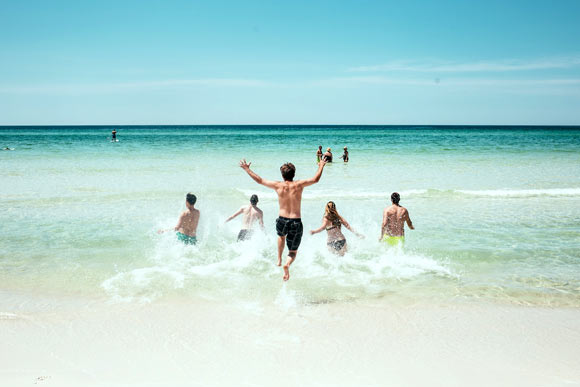A new study by University of California, Irvine researchers has found that recreational ocean water exposure changes the human skin microbiome, and waterborne microbes persist on the skin for at least 24 hours.

Swimming in the ocean alters the skin microbiome and may increase the likelihood of infection. Image credit: Pexels.
Skin is the human body’s first line of defense, both physically and immunologically, against invading microorganisms and simultaneously supports the growth of diverse microbial communities. Environmental exposures, including microbial exposures, can alter the skin microbiome.
Recreational ocean water activities have been linked to microbial infections, and skin infections are most frequently reported.
Water activities can simultaneously wash off normal flora and expose skin to potential pathogens in the ocean.
“The primary objective of the study was to determine if recreational ocean water exposure alters the human skin microbiome and how long these changes persist,” said University of California, Irvine scientists Marisa Chattman Nielsen and Professor Sunny Jiang.
The researchers sought 9 volunteers at a beach who met criteria of no sunscreen use, infrequent exposure to the ocean, no bathing within the last 12 hours, and no antibiotics during the previous six months.
The team swabbed the participants on the back of the calf before they entered the water, and again after subjects had air dried completely following a 10-minute swim and at six and 24 hours post swim.
Before swimming, all individuals had different communities from one-another, but after swimming, they all had similar communities on their skin, which were completely different from the ‘before swim’ communities.
At six hours post swim, the microbiomes had begun to revert to their pre-swim composition, and at 24 hours, they were far along in that process.
“One very interesting finding was that Vibrio species — only identified to the genus level — were detected on every participant after swimming in the ocean, and air drying,” Nielsen said.
At six hours post swim, they were still present on most of the volunteers, but by 24 hours, they were present only on one individual.
“While many Vibrio are not pathogenic, the fact that we recovered them on the skin after swimming demonstrates that pathogenic Vibrio species could potentially persist on the skin after swimming,” Nielsen said.
The fraction of Vibrio species detected on human skin was more than 10 times greater than the fraction in the ocean water sample, suggesting a specific affinity for attachment to human skin.
“Our data demonstrate for the first time that ocean water exposure can alter the diversity and composition of the human skin microbiome,” Nielsen said.
“While swimming normal resident bacteria were washed off while ocean bacteria were deposited onto the skin.”
The scientists presented the findings June 23 at ASM Microbe 2019, the annual meeting of the American Society for Microbiology, in San Francisco, CA.
_____
M. Nielsen & S. Jiang. Alterations in the Human Skin Microbiome after Ocean Water Exposure. ASM Microbe 2019







